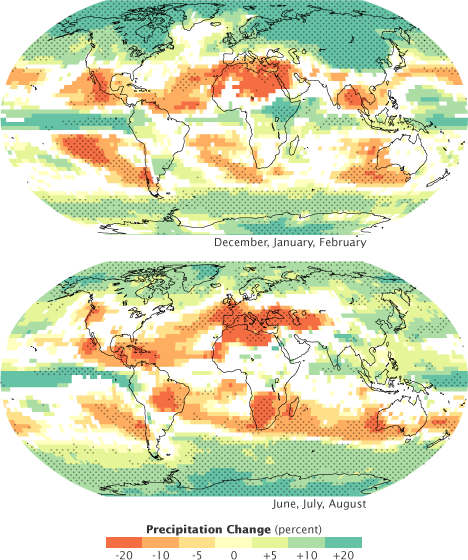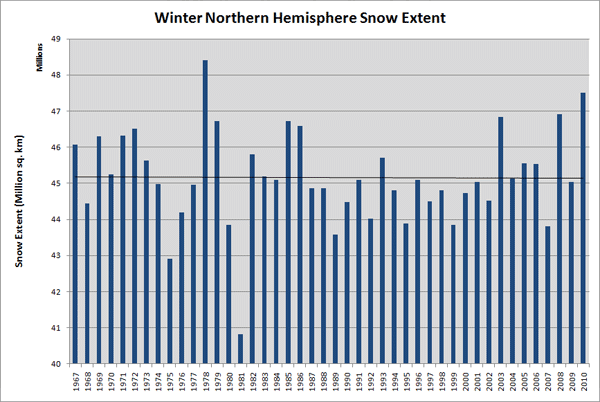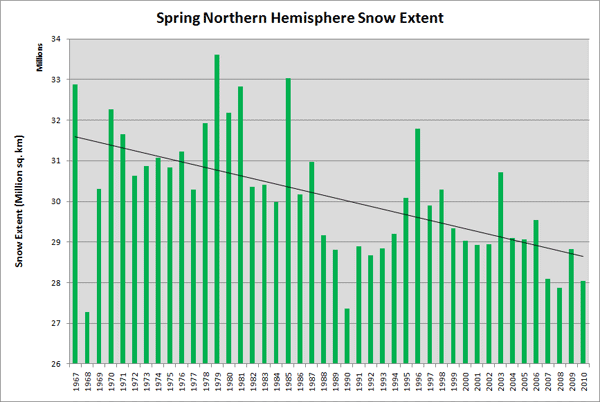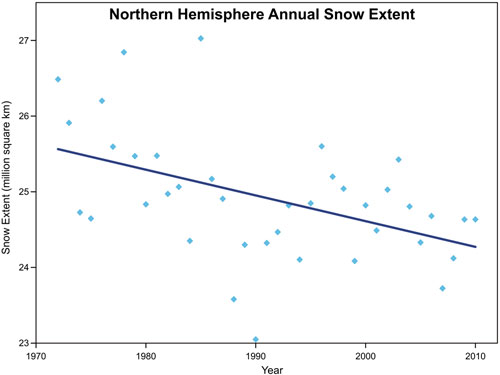Monckton Myth #7: Snowjob
Posted on 25 January 2011 by dana1981
 As part of an ongoing series looking at Christopher Monckton’s response to Mike Steketee, this post examines Monckton’s arguments about global snow cover. In response to Steketee's claim that global snow cover is declining, Monckton claims in his point #10:
As part of an ongoing series looking at Christopher Monckton’s response to Mike Steketee, this post examines Monckton’s arguments about global snow cover. In response to Steketee's claim that global snow cover is declining, Monckton claims in his point #10:
"a new record high for snow cover was set in the winter of 2008/2009, and there is some chance that a further record high will be set this year."
Cherries Don't Grow in Winter
The fundamental flaw in this argument is rather obvious, and one which Monckton seems to commit on a regular basis - cherrypicking of short-term data. In this case he chose a 3-month period to support his claim that snow cover is not falling. Quite obviously we cannot determine a long-term trend from 3 months' worth of data.
On top of that, Monckton has chosen a very peculiar 3-month period to evaluate. Why is winter snow cover more indicative of the long-term trend than fall, spring, or summer? In fact, Monckton has cherrypicked his seasons wisely, because the best way to support the false claim that global snow cover is not declining is to ignore the hotter months of the year.
Why Should Snow Cover Decline?
In the near future, global warming will not necessarily result in less winter snowfall globally. Some regions will experience more winter precipitation, which in many regions will fall primarily as snow even if temperatures rise a few degrees, and some regions will receive less. The top map in the figure below shows climate model projections of future winter precipitation changes from the 2007 IPCC report.

In short, we don't necessarily expect winter snow fall or snow cover to decline in the short-term in a warming world. What we do expect is for this snow cover to melt earlier as spring arrives sooner, and at higher temperatures.
What Does the Data Show?
Monckton's statements are difficult to evaluate because he provides no supporting evidence or references. However, the Rutgers University Global Snow Lab has perhaps the most commonly-used snow cover data, though only for the Northern Hemisphere (NH). In fact, Rutgers does the work for us in plotting seasonal NH snow extents. Here is their plot for the winter:

As you can see, the data appears not to support Monckton's claim. The largest winter NH snow extent was in 1977-78. 2007-08 had the third-highest extent. The winter of 2008-09 comes in about 23rd place out of 44 winters on record. The winter of 2009-10 did come in second, however.
But more importantly, Rutgers also plots the spring NH snow extent:

This paints quite a different picture. As expected in a warming world, the spring NH snow cover extent is declining quite significantly. Rutgers also provides weekly and monthly data for their entire record in tabular format. I plopped the data into a spreadsheet, took annual averages, plotted the data, and added a simple linear trend line. Here is the result:

As expected, there is again a significant long-term drop in NH snow extent, this time looking at all the available data. The trend demonstrates a decline of approximately 1.3 million square kilometers from 1972 to 2010. This decline is confirmed by Déry and Brown (2007), which found a 1.28 million square kilometer decline in NH snow cover from 1972 to 2006. In other words, NH snow extent is declining by approximately 34,000 square kilometers per year.
Why Does it Matter?
Snow is white and highly reflective. When it melts, it reveals the much darker ground beneath. Thus the larger the snow cover extent and the longer it lasts into the spring, the more solar energy the planet will reflect. As snow cover declines, the planet absorbs more solar energy (this loss of reflectivity is known as decreasing albedo), accelerating global warming as a result.
In fact, a new study by Flanner et al. (2011) has found that so far, snow cover is declining more rapidly and causing more global warming than climate models expect.
"We find that cyrospheric cooling declined by 0.45?W?m?2 from 1979 to 2008, with nearly equal contributions from changes in land snow cover and sea ice. On the basis of these observations, we conclude that the albedo feedback from the Northern Hemisphere cryosphere falls between 0.3 and 1.1?W?m?2?K?1, substantially larger than comparable estimates obtained from 18 climate models."
Flanner et al. also show that the radiative forcing from snow cover in the winter months is relatively small, whereas the cooling effect is largest in the spring and summer months (March through July in the NH). This is because in winter, the days are shorter and the sunlight weaker, so albedo has less impact. This again confirms that if we want to evaluate the impact of changing snow cover on the climate, we should be looking at the spring and summer months, not the winter, as Monckton does. Flanner et al. find that the change in snow radiative forcing in the spring and summer months has been significantly positive (less cooling) from 1979 to 2008.
So not only is Monckton's suggestion that snow cover is not declining incorrect, but in fact it's declining faster than climate scientists anticipated, and contributing significantly to global warming as a result. Monckton arrives at an incorrect conclusion not only by cherrypicking 3 months out of a 40 year record (0.6% of the available data), but also by looking at the least relevant months of the year (winter).































 Arguments
Arguments























 0
0  0
0 Since Goddard omits the data prior to 1989, had he been using this WUWT post as a reference, Monckton would not be aware that 1978-79 had the record NH snow extent.
I'm still not sure how Monckton would have confused the "record" of 2009-10 with 2008-09, perhaps just being careless.
Since Goddard omits the data prior to 1989, had he been using this WUWT post as a reference, Monckton would not be aware that 1978-79 had the record NH snow extent.
I'm still not sure how Monckton would have confused the "record" of 2009-10 with 2008-09, perhaps just being careless.

 The graph is from 1967-2010 whole years only - no partial years with substituted data where data was missing.
There doesn't seem to be a very strong trend, but it does look to be downwards.
That said, at around 1989 the averages jump to a lower level and then remain very consistent, with possibly a tiny trend upwards. Would it be not reasonable to suspect that there was some kind of change in data collection? Especially since the averages in the preceding 20 or so years jump around a lot and then ones that follow are much more consistent?
The graph is from 1967-2010 whole years only - no partial years with substituted data where data was missing.
There doesn't seem to be a very strong trend, but it does look to be downwards.
That said, at around 1989 the averages jump to a lower level and then remain very consistent, with possibly a tiny trend upwards. Would it be not reasonable to suspect that there was some kind of change in data collection? Especially since the averages in the preceding 20 or so years jump around a lot and then ones that follow are much more consistent?
 Do you not see the title of that Figure?
"Northern Hemisphere Annual Snow Extent"
And if future when submitting graphs, please use the appropriate scale for the axes, in you case the y-axis. Thanks.
Do you not see the title of that Figure?
"Northern Hemisphere Annual Snow Extent"
And if future when submitting graphs, please use the appropriate scale for the axes, in you case the y-axis. Thanks.







Comments